改特殊疑问句
陈述句变一般疑问句特殊疑问句及练习
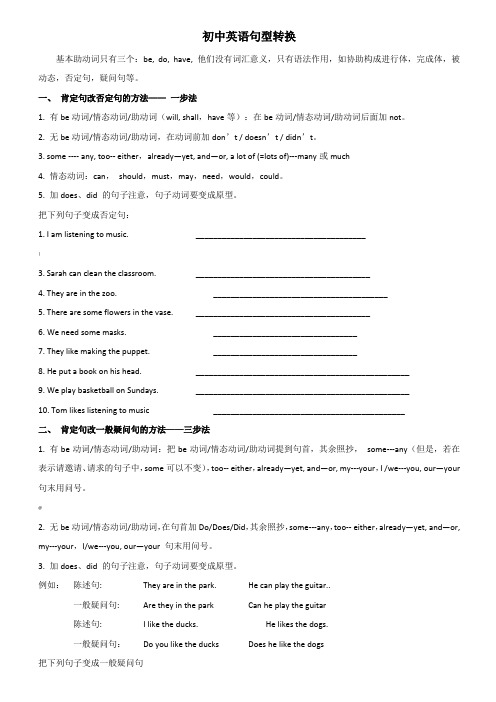
初中英语句型转换基本助动词只有三个:be, do, have, 他们没有词汇意义,只有语法作用,如协助构成进行体,完成体,被动态,否定句,疑问句等。
一、肯定句改否定句的方法——一步法1. 有be动词/情态动词/助动词(will, shall,have等):在be动词/情态动词/助动词后面加not。
2. 无be动词/情态动词/助动词,在动词前加don’t / doesn’t / didn’t。
3. some ---- any,too-- either,already—yet, and—or, a lot of (=lots of)---many或much4. 情态动词:can,should,must,may,need,would,could。
5. 加does、did 的句子注意,句子动词要变成原型。
把下列句子变成否定句:1. I am listening to music. _______________________________________|3. Sarah can clean the classroom. ________________________________________4. They are in the zoo. ________________________________________5. There are some flowers in the vase. ________________________________________6. We need some masks. _________________________________7. They like making the puppet. _________________________________8. He put a book on his head. _________________________________________________9. We play basketball on Sundays. _________________________________________________10. Tom likes listening to music ____________________________________________二、肯定句改一般疑问句的方法——三步法1. 有be动词/情态动词/助动词:把be动词/情态动词/助动词提到句首,其余照抄,some---any(但是,若在表示请邀请、请求的句子中,some可以不变),too-- either,already—yet, and—or, my---your,I /we---you, our—your 句末用问号。
陈述句变一般疑问句特殊疑问句及练习
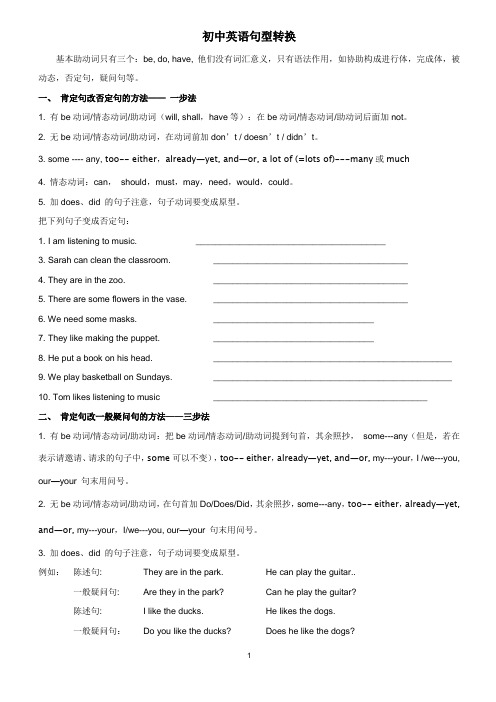
初中英语句型转换基本助动词只有三个:be, do, have, 他们没有词汇意义,只有语法作用,如协助构成进行体,完成体,被动态,否定句,疑问句等。
一、肯定句改否定句的方法——一步法1. 有be动词/情态动词/助动词(will, shall,have等):在be动词/情态动词/助动词后面加not。
2. 无be动词/情态动词/助动词,在动词前加don’t / doesn’t / didn’t。
3. some ---- any,too-- either,already—yet, and—or, a lot of (=lots of)---many或much4. 情态动词:can,should,must,may,need,would,could。
5. 加does、did 的句子注意,句子动词要变成原型。
把下列句子变成否定句:1. I am listening to music. _______________________________________3. Sarah can clean the classroom. ________________________________________4. They are in the zoo. ________________________________________5. There are some flowers in the vase. ________________________________________6. We need some masks. _________________________________7. They like making the puppet. _________________________________8. He put a book on his head. _________________________________________________9. We play basketball on Sundays. _________________________________________________10. Tom likes listening to music ____________________________________________二、肯定句改一般疑问句的方法——三步法1. 有be动词/情态动词/助动词:把be动词/情态动词/助动词提到句首,其余照抄,some---any(但是,若在表示请邀请、请求的句子中,some可以不变),too-- either,already—yet, and—or, my---your,I /we---you, our—your 句末用问号。
肯定句变特殊疑问句的方法
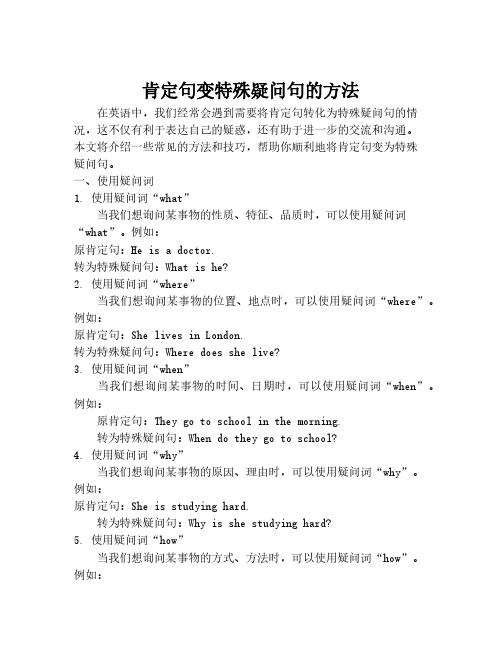
肯定句变特殊疑问句的方法在英语中,我们经常会遇到需要将肯定句转化为特殊疑问句的情况,这不仅有利于表达自己的疑惑,还有助于进一步的交流和沟通。
本文将介绍一些常见的方法和技巧,帮助你顺利地将肯定句变为特殊疑问句。
一、使用疑问词1. 使用疑问词“what”当我们想询问某事物的性质、特征、品质时,可以使用疑问词“what”。
例如:原肯定句:He is a doctor.转为特殊疑问句:What is he?2. 使用疑问词“where”当我们想询问某事物的位置、地点时,可以使用疑问词“where”。
例如:原肯定句:She lives in London.转为特殊疑问句:Where does she live?3. 使用疑问词“when”当我们想询问某事物的时间、日期时,可以使用疑问词“when”。
例如:原肯定句:They go to school in the morning.转为特殊疑问句:When do they go to school?4. 使用疑问词“why”当我们想询问某事物的原因、理由时,可以使用疑问词“why”。
例如:原肯定句:She is studying hard.转为特殊疑问句:Why is she studying hard?5. 使用疑问词“how”当我们想询问某事物的方式、方法时,可以使用疑问词“how”。
例如:原肯定句:He solved the problem.转为特殊疑问句:How did he solve the problem?二、将助动词提前在一些情况下,我们可以通过将助动词提前来将肯定句变为特殊疑问句。
例如:原肯定句:She can speak French.转为特殊疑问句:Can she speak French?三、使用陈述句语序当我们将肯定句变为特殊疑问句时,可以直接使用陈述句的语序,即主语+谓语+其他成分。
例如:原肯定句:They have finished their homework.转为特殊疑问句:Have they finished their homework?四、加入特殊疑问词和助动词有时候,我们需要在特殊疑问句中加入特殊疑问词和助动词,以满足语法结构的要求。
一般疑问句改特殊疑问的方法
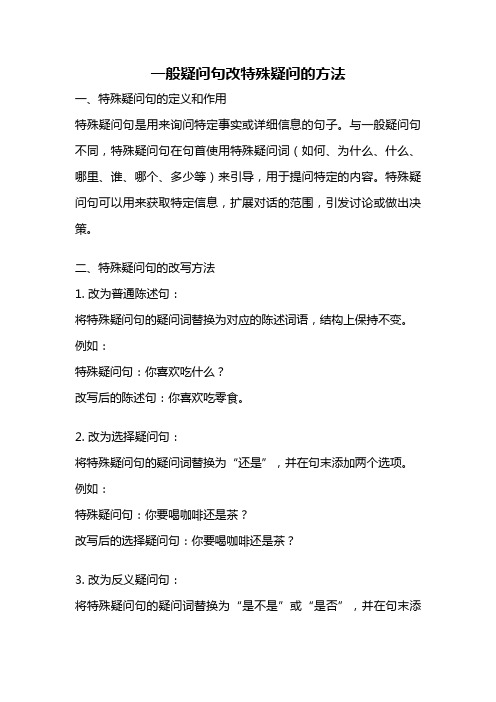
一般疑问句改特殊疑问的方法一、特殊疑问句的定义和作用特殊疑问句是用来询问特定事实或详细信息的句子。
与一般疑问句不同,特殊疑问句在句首使用特殊疑问词(如何、为什么、什么、哪里、谁、哪个、多少等)来引导,用于提问特定的内容。
特殊疑问句可以用来获取特定信息,扩展对话的范围,引发讨论或做出决策。
二、特殊疑问句的改写方法1. 改为普通陈述句:将特殊疑问句的疑问词替换为对应的陈述词语,结构上保持不变。
例如:特殊疑问句:你喜欢吃什么?改写后的陈述句:你喜欢吃零食。
2. 改为选择疑问句:将特殊疑问句的疑问词替换为“还是”,并在句末添加两个选项。
例如:特殊疑问句:你要喝咖啡还是茶?改写后的选择疑问句:你要喝咖啡还是茶?3. 改为反义疑问句:将特殊疑问句的疑问词替换为“是不是”或“是否”,并在句末添加一个相反的陈述。
例如:特殊疑问句:你明天要来参加会议吗?改写后的反义疑问句:你明天要来参加会议,是不是?4. 改为带有否定意义的特殊疑问句:将特殊疑问句的疑问词替换为“不是什么”或“不怎么”,并在句末添加一个否定的陈述。
例如:特殊疑问句:你不是在学校吗?改写后的带有否定意义的特殊疑问句:你不是不在学校吗?5. 改为带有原因的特殊疑问句:将特殊疑问句的疑问词替换为“为什么”,并在句末加上原因。
例如:特殊疑问句:你为什么不喜欢吃辣?改写后的带有原因的特殊疑问句:你为什么不喜欢吃辣,因为太辣了吗?6. 改为带有补充信息的特殊疑问句:将特殊疑问句的疑问词替换为“还有什么”或“除了...还有”,并在句末加上补充信息。
例如:特殊疑问句:你学过哪些外语?改写后的带有补充信息的特殊疑问句:你学过哪些外语,还有什么?7. 改为带有时间信息的特殊疑问句:将特殊疑问句的疑问词替换为“什么时候”,并在句末加上时间信息。
例如:特殊疑问句:你什么时候去旅行?改写后的带有时间信息的特殊疑问句:你什么时候去旅行,明天还是下周?8. 改为带有地点信息的特殊疑问句:将特殊疑问句的疑问词替换为“在哪里”,并在句末加上地点信息。
陈述句变否定句一般疑问句特殊疑问句和练习试题
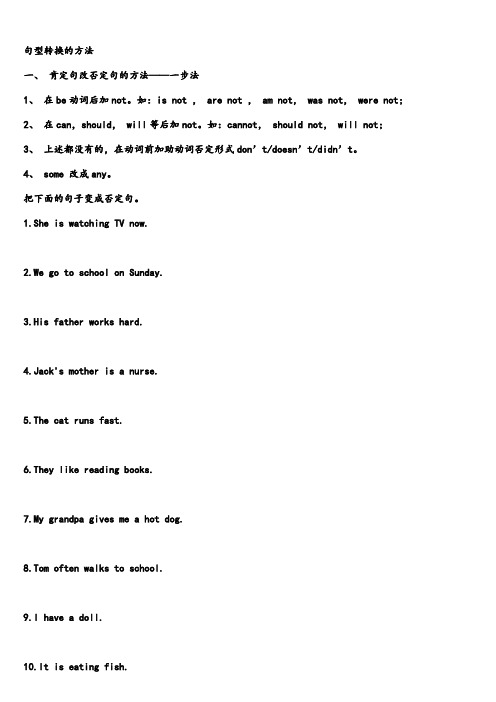
句型转换的方法一、肯定句改否定句的方法——一步法1、在be动词后加not。
如:is not , are not , am not, was not, were not;2、在can,should, will等后加not。
如:cannot, should not, will not;3、上述都没有的,在动词前加助动词否定形式don’t/doesn’t/didn’t。
4、 some 改成any。
把下面的句子变成否定句。
1.She is watching TV now.2.We go to school on Sunday.3.His father works hard.4.Jack's mother is a nurse.5.The cat runs fast.6.They like reading books.7.My grandpa gives me a hot dog.8.Tom often walks to school.9.I have a doll.10.It is eating fish.二、肯定句改一般疑问句的方法——三步法1、把be动词放在句首,剩下的照抄,(some 改成any,my改成your等)句点改成问号。
2、把can,shall, will等放到句首,剩下的照抄,(some 改成any,my改成your等)句点改成问号。
例如:陈述句: They are in the park. He can play the guitar..一般疑问句: Are they in the park? Can he play the guitar?把下列句子变成一般疑问句1. I am listening to music.______________________________________2. Mike is a student._______________________________________3. Sarah can clean the classroom.________________________________________4. They are in the zoo.________________________________________5. There are some flowers in the vase.________________________________________6.This is my sister._________________________________________7.We are sweeping the floor.__________________________________________3、上述都没有的,在句首请助动词Do/Does/Did帮忙,剩下的照抄,(some 改成any,my改成your 等)句点改成问号。
小学英语句型转换(陈述句变一般疑问句特殊疑问句及练习)
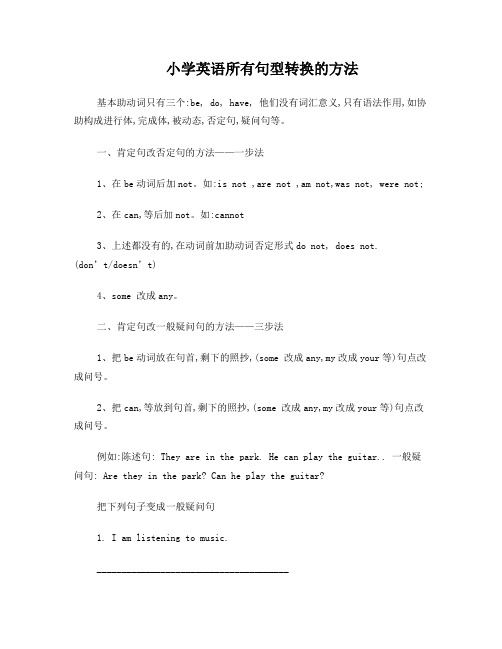
小学英语所有句型转换的方法基本助动词只有三个:be, do, have, 他们没有词汇意义,只有语法作用,如协助构成进行体,完成体,被动态,否定句,疑问句等。
一、肯定句改否定句的方法——一步法1、在be动词后加not。
如:is not ,are not ,am not,was not, were not;2、在can,等后加not。
如:cannot3、上述都没有的,在动词前加助动词否定形式do not, does not.(don’t/doesn’t)4、some 改成any。
二、肯定句改一般疑问句的方法——三步法1、把be动词放在句首,剩下的照抄,(some 改成any,my改成your等)句点改成问号。
2、把can,等放到句首,剩下的照抄,(some 改成any,my改成your等)句点改成问号。
例如:陈述句: They are in the park. He can play the guitar.. 一般疑问句: Are they in the park? Can he play the guitar?把下列句子变成一般疑问句1. I am listening to music._______________________________________2. Mike is a student._______________________________________3. Sarah can clean the classroom.________________________________________4. They are in the zoo.________________________________________5. There are some flowers in the vase.________________________________________6.This is my sister._________________________________________7.We are sweeping the floor.__________________________________________3、上述都没有的,在句首请助动词Do/Does帮忙,剩下的照抄, (some 改成any,my改成your等)句点改成问号。
陈述句变特殊疑问句的规则总结
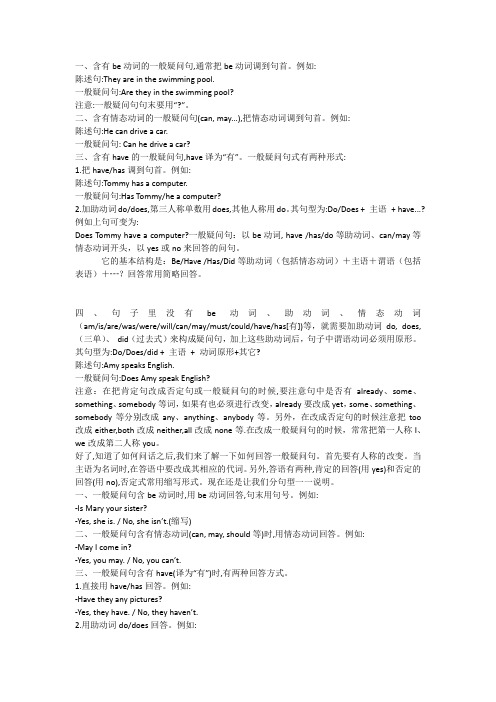
一、含有be动词的一般疑问句,通常把be动词调到句首。
例如:陈述句:They are in the swimming pool.一般疑问句:Are they in the swimming pool?注意:一般疑问句句末要用“?”。
二、含有情态动词的一般疑问句(can, may...),把情态动词调到句首。
例如:陈述句:He can drive a car.一般疑问句: Can he drive a car?三、含有have的一般疑问句,have译为“有”。
一般疑问句式有两种形式:1.把have/has调到句首。
例如:陈述句:Tommy has a computer.一般疑问句:Has Tommy/he a computer?2.加助动词do/does,第三人称单数用does,其他人称用do。
其句型为:Do/Does + 主语+ have...?例如上句可变为:Does Tommy have a computer?一般疑问句:以be动词, have /has/do等助动词、can/may等情态动词开头,以yes或no来回答的问句。
它的基本结构是:Be/Have /Has/Did等助动词(包括情态动词)+主语+谓语(包括表语)+┄?回答常用简略回答。
四、句子里没有be动词、助动词、情态动词(am/is/are/was/were/will/can/may/must/could/have/has[有])等,就需要加助动词do, does,(三单)、did(过去式)来构成疑问句,加上这些助动词后,句子中谓语动词必须用原形。
其句型为:Do/Does/did + 主语+ 动词原形+其它?陈述句:Amy speaks English.一般疑问句:Does Amy speak English?注意:在把肯定句改成否定句或一般疑问句的时候,要注意句中是否有already、some、something、somebody等词,如果有也必须进行改变,already要改成yet,some、something、somebody等分别改成any、anything、anybody等。
英语所有句型转换的方法(陈述句变否定句一般疑问句特殊疑问句及练习)
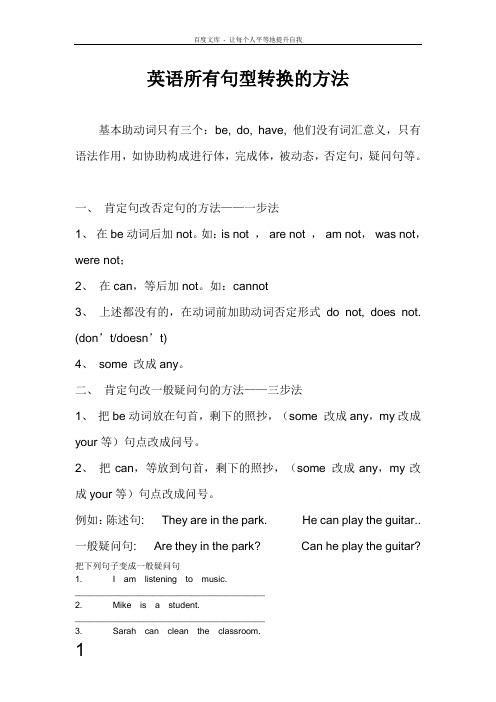
英语所有句型转换的方法基本助动词只有三个:be, do, have, 他们没有词汇意义,只有语法作用,如协助构成进行体,完成体,被动态,否定句,疑问句等。
一、肯定句改否定句的方法——一步法1、在be动词后加not。
如:is not ,are not ,am not,was not,were not;2、在can,等后加not。
如:cannot3、上述都没有的,在动词前加助动词否定形式do not, does not. (don’t/doesn’t)4、some 改成any。
二、肯定句改一般疑问句的方法——三步法1、把be动词放在句首,剩下的照抄,(some 改成any,my改成your等)句点改成问号。
2、把can,等放到句首,剩下的照抄,(some 改成any,my改成your等)句点改成问号。
例如:陈述句: They are in the park. He can play the guitar.. 一般疑问句: Are they in the park? Can he play the guitar?把下列句子变成一般疑问句1. I am listening to music._______________________________________2. Mike is a student._______________________________________3. Sarah can clean the classroom.________________________________________4. They are in the zoo.________________________________________5. There are some flowers in the vase.________________________________________is my sister._________________________________________are sweeping the floor.__________________________________________3、上述都没有的,在句首请助动词Do/Does帮忙,剩下的照抄,(some 改成any,my改成your等)句点改成问号。
句型转换特殊疑问句
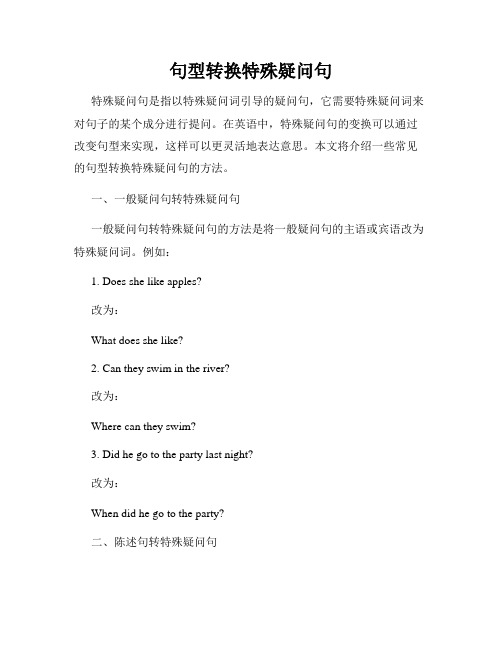
句型转换特殊疑问句特殊疑问句是指以特殊疑问词引导的疑问句,它需要特殊疑问词来对句子的某个成分进行提问。
在英语中,特殊疑问句的变换可以通过改变句型来实现,这样可以更灵活地表达意思。
本文将介绍一些常见的句型转换特殊疑问句的方法。
一、一般疑问句转特殊疑问句一般疑问句转特殊疑问句的方法是将一般疑问句的主语或宾语改为特殊疑问词。
例如:1. Does she like apples?改为:What does she like?2. Can they swim in the river?改为:Where can they swim?3. Did he go to the party last night?改为:When did he go to the party?二、陈述句转特殊疑问句陈述句转特殊疑问句的方法是将陈述句中的句子成分变为以特殊疑问词引导的特殊疑问句。
例如:1. She is going to the supermarket.改为:Where is she going?2. They went to the beach yesterday.改为:When did they go to the beach?3. John bought a new car.改为:Who bought a new car?三、特殊疑问句转陈述句特殊疑问句转陈述句的方法是将特殊疑问句中的特殊疑问词换成陈述句中相应的成分。
例如:1. What color is his jacket?改为:His jacket is black.2. Where did he find his phone?改为:He found his phone in the park.3. How many books did she read?改为:She read five books.四、特殊疑问句转选择疑问句特殊疑问句转选择疑问句的方法是将特殊疑问句中的特殊疑问词换成“or not”。
改特殊疑问句练习题
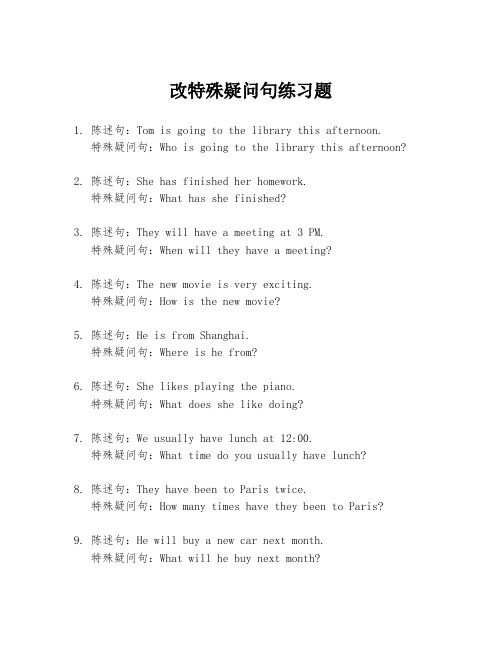
改特殊疑问句练习题1. 陈述句:Tom is going to the library this afternoon.特殊疑问句:Who is going to the library this afternoon?2. 陈述句:She has finished her homework.特殊疑问句:What has she finished?3. 陈述句:They will have a meeting at 3 PM.特殊疑问句:When will they have a meeting?4. 陈述句:The new movie is very exciting.特殊疑问句:How is the new movie?5. 陈述句:He is from Shanghai.特殊疑问句:Where is he from?6. 陈述句:She likes playing the piano.特殊疑问句:What does she like doing?7. 陈述句:We usually have lunch at 12:00.特殊疑问句:What time do you usually have lunch?8. 陈述句:They have been to Paris twice.特殊疑问句:How many times have they been to Paris?9. 陈述句:He will buy a new car next month.特殊疑问句:What will he buy next month?10. 陈述句:The concert starts at 7:30 PM.特殊疑问句:What time does the concert start?11. 陈述句:She has been learning English for three years.特殊疑问句:How long has she been learning English?12. 陈述句:They are planning to go on a trip next weekend.特殊疑问句:What are they planning to do next weekend?13. 陈述句:The book is on the table.特殊疑问句:Where is the book?14. 陈述句:He can speak three languages.特殊疑问句:How many languages can he speak?15. 陈述句:She is reading a novel.特殊疑问句:What is she reading?16. 陈述句:They have been working here since 2010.特殊疑问句:Since when have they been working here?17. 陈述句:The store opens at 9 AM.特殊疑问句:When does the store open?18. 陈述句:She is waiting for the bus at the bus stop.特殊疑问句:Where is she waiting?19. 陈述句:He has visited five countries.特殊疑问句:How many countries has he visited?20. 陈述句:The party will be held at my house.特殊疑问句:Where will the party be held?21. 陈述句:They are learning French at the language school.特殊疑问句:What language are they learning at the language school?22. 陈述句:The concert was amazing.特殊疑问句:How was the concert?23. 陈述句:She is a doctor.特殊疑问句:What is her profession?24. 陈述句:He has been swimming for two hours.特殊疑问句:How long has he been swimming?25. 陈述句:The train leaves at 5 PM.特殊疑问句:What time does the train leave?26. 陈述句:They will travel to Japan next year.特殊疑问句:Where will they travel next year?27. 陈述句:She has a beautiful voice.特殊疑问句:What does she have?28. 陈述句:The meeting room is on the second floor.特殊疑问句:Where is the meeting room?29. 陈述句:He has been playing the guitar since he was ten.特殊疑问句:Since when has he been playing the guitar?30. 陈述句:The movie was released last Friday.特殊疑问句:When was the movie released?注意:请根据上述陈述句改写成相应的特殊疑问句,并确保疑问句的语法正确,表达清晰。
陈述句变一般疑问句特殊疑问句及练习

初中英语句型转换基本助动词只有三个:be, do, have, 他们没有词汇意义,只有语法作用,如协助构成进行体,完成体,被动态,否定句,疑问句等。
一、肯定句改否定句的方法——一步法1. 有be动词/情态动词/助动词(will, shall,have等):在be动词/情态动词/助动词后面加not。
2. 无be动词/情态动词/助动词,在动词前加don’t / doesn’t / didn’t。
3. some ---- any,too-- either,already—yet, and—or, a lot of (=lots of)---many或much4. 情态动词:can,should,must,may,need,would,could。
5. 加does、did 的句子注意,句子动词要变成原型。
把下列句子变成否定句:1. I am listening to music. _______________________________________|3. Sarah can clean the classroom. ________________________________________4. They are in the zoo. ________________________________________5. There are some flowers in the vase. ________________________________________6. We need some masks. _________________________________7. They like making the puppet. _________________________________8. He put a book on his head. _________________________________________________9. We play basketball on Sundays. _________________________________________________10. Tom likes listening to music ____________________________________________二、肯定句改一般疑问句的方法——三步法1. 有be动词/情态动词/助动词:把be动词/情态动词/助动词提到句首,其余照抄,some---any(但是,若在表示请邀请、请求的句子中,some可以不变),too-- either,already—yet, and—or, my---your,I /we---you, our—your 句末用问号。
陈述句改为特殊疑问句例子
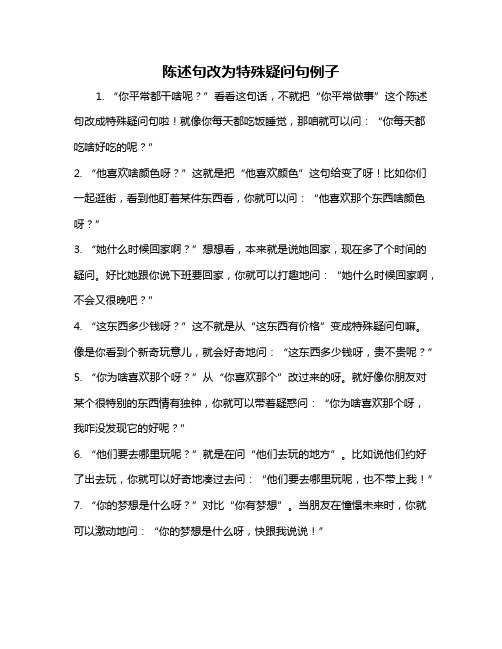
陈述句改为特殊疑问句例子
1. “你平常都干啥呢?”看看这句话,不就把“你平常做事”这个陈述句改成特殊疑问句啦!就像你每天都吃饭睡觉,那咱就可以问:“你每天都吃啥好吃的呢?”
2. “他喜欢啥颜色呀?”这就是把“他喜欢颜色”这句给变了呀!比如你们一起逛街,看到他盯着某件东西看,你就可以问:“他喜欢那个东西啥颜色呀?”
3. “她什么时候回家啊?”想想看,本来就是说她回家,现在多了个时间的疑问。
好比她跟你说下班要回家,你就可以打趣地问:“她什么时候回家啊,不会又很晚吧?”
4. “这东西多少钱呀?”这不就是从“这东西有价格”变成特殊疑问句嘛。
像是你看到个新奇玩意儿,就会好奇地问:“这东西多少钱呀,贵不贵呢?”
5. “你为啥喜欢那个呀?”从“你喜欢那个”改过来的呀。
就好像你朋友对某个很特别的东西情有独钟,你就可以带着疑惑问:“你为啥喜欢那个呀,我咋没发现它的好呢?”
6. “他们要去哪里玩呢?”就是在问“他们去玩的地方”。
比如说他们约好了出去玩,你就可以好奇地凑过去问:“他们要去哪里玩呢,也不带上我!”
7. “你的梦想是什么呀?”对比“你有梦想”。
当朋友在憧憬未来时,你就可以激动地问:“你的梦想是什么呀,快跟我说说!”
我的观点结论:把陈述句改成特殊疑问句其实很简单也很有趣啊,在生活中多问问这些问题,会让交流变得更有意思呢!。
小学四年级陈述句变特殊疑问句(含练习及答案)
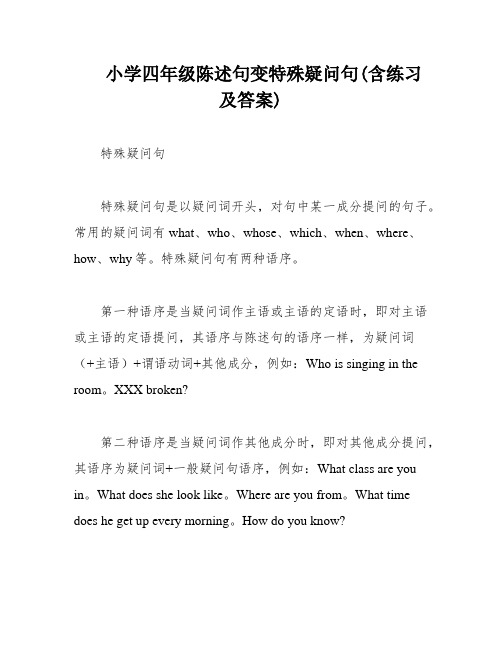
小学四年级陈述句变特殊疑问句(含练习及答案)特殊疑问句特殊疑问句是以疑问词开头,对句中某一成分提问的句子。
常用的疑问词有what、who、whose、which、when、where、how、why等。
特殊疑问句有两种语序。
第一种语序是当疑问词作主语或主语的定语时,即对主语或主语的定语提问,其语序与陈述句的语序一样,为疑问词(+主语)+谓语动词+其他成分,例如:Who is singing in the room。
XXX broken?第二种语序是当疑问词作其他成分时,即对其他成分提问,其语序为疑问词+一般疑问句语序,例如:What class are you in。
What does she look like。
Where are you from。
What time does he get up every morning。
How do you know?在特殊疑问句中,还有一些特殊的语法结构。
例如,特殊疑问词+助动词+主语+动词原形+其他,例如:Where do you study English。
特殊疑问词+be动词+主语+其他,例如:Whyis your Mum so angry。
特殊疑问词+情态动词+主语+动词原形+其他,例如:What can I do for you?需要注意的是,在回答特殊疑问句时,不能简单地用yes/no来回答,而应该具体回答问题。
例如,当问到Who is from Canada?时,回答应该是XXX。
当问到Where's XXX?时,回答应该是Near the XXX。
当问到Why do you like koalas?时,回答应该是Because they are cute。
在将肯定句变成特殊疑问句时,需要分三步骤。
首先变成一般疑问句,然后找到合适的特殊疑问词代替划线部分,最后将特殊疑问词提前放到句首,并大写,其余按顺序照抄,省略划线部分。
需要注意的是,如果问的是主语或主语的定语时,语序不变,为"特殊疑问词(+主语)+陈述句"。
一般疑问句变特殊疑问句
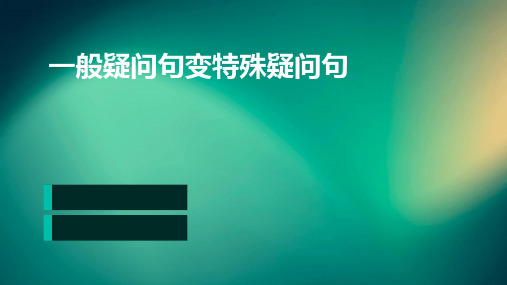
以特殊疑问词(如what、who、where、when、why、how等)开头,后面 接一般疑问句语序。例如:“What are you doing?”(你正在做什么?)
语义功能对比
一般疑问句
用于询问某事或某情况是否属实,回答通常是“Yes”或 “No”。
特殊疑问句
用于询问具体的信息,如时间、地点、方式等,回答应提供 相应的详细信息。
例如
Where are you from? 你来自哪里?Where did you go last night? 你昨晚去哪里了?
Why(为什么)引导的特殊疑问句
句型结构
Why + do/does/did + 主语 + do?Why + is/are/was/were + 主语 + 形容词/介词 短语?
使用场景举例
一般疑问句
当你想确认某事或某情况时,如:“Do you live nearb:“Where did you find your lost keys?”(你在 哪里找到你丢失的钥匙的?)
03 转换步骤详解
确定疑问词及位置
01
When + did/will/do + 主语 + do? When + is/are/was/were + 时间状语?
VS
例如
When did you arrive? 你什么时候到达 的?When is the meeting? 会议是什么 时候?
Where(哪里)引导的特殊疑问句
句型结构
Where + is/are/was/were + 主语?Where + do/does/did + 主语 + go?
英语-特殊疑问句
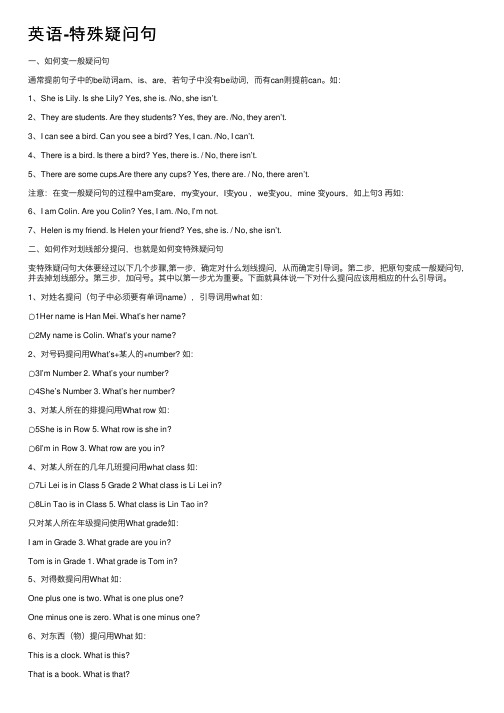
英语-特殊疑问句⼀、如何变⼀般疑问句通常提前句⼦中的be动词am、is、are,若句⼦中没有be动词,⽽有can则提前can。
如:1、She is Lily. Is she Lily? Yes, she is. /No, she isn’t.2、They are students. Are they students? Yes, they are. /No, they aren’t.3、I can see a bird. Can you see a bird? Yes, I can. /No, I can’t.4、There is a bird. Is there a bird? Yes, there is. / No, there isn’t.5、There are some cups.Are there any cups? Yes, there are. / No, there aren’t.注意:在变⼀般疑问句的过程中am变are,my变your,I变you ,we变you,mine 变yours,如上句3 再如:6、I am Colin. Are you Colin? Yes, I am. /No, I’m not.7、Helen is my friend. Is Helen your friend? Yes, she is. / No, she isn’t.⼆、如何作对划线部分提问,也就是如何变特殊疑问句变特殊疑问句⼤体要经过以下⼏个步骤,第⼀步,确定对什么划线提问,从⽽确定引导词。
第⼆步,把原句变成⼀般疑问句,并去掉划线部分。
第三步,加问号。
其中以第⼀步尤为重要。
下⾯就具体说⼀下对什么提问应该⽤相应的什么引导词。
1、对姓名提问(句⼦中必须要有单词name),引导词⽤what 如:○1Her name is Han Mei. What’s her name?○2My name is Colin. What’s your name?2、对号码提问⽤What’s+某⼈的+number? 如:○3I’m Number 2. What’s your number?○4She’s Number 3. What’s her number?3、对某⼈所在的排提问⽤What row 如:○5She is in Row 5. What row is she in?○6I’m in Row 3. What row are you in?4、对某⼈所在的⼏年⼏班提问⽤what class 如:○7Li Lei is in Class 5 Grade 2 What class is Li Lei in?○8Lin Tao is in Class 5. What class is Lin Tao in?只对某⼈所在年级提问使⽤What grade如:I am in Grade 3. What grade are you in?Tom is in Grade 1. What grade is Tom in?5、对得数提问⽤What 如:One plus one is two. What is one plus one?One minus one is zero. What is one minus one?6、对东西(物)提问⽤What 如:This is a clock. What is this?These are boxes. What are these?Those are buses. What are those?注意:对there be 句型中的物提问时,不论原句中的物是单数还是复数,be动词⼀律⽤is, ⽽且要省略there. 如:There is a bird in the tree. What is in the tree?There are many chairs in the room. What’s in the room?7、对年龄提问⽤How old 如:I am twelve. How old are you?Kate is thirteen. How old is Kate?8、对⾝体是否健康提问⽤How 如:Lily is fine. How is Lily?I’m fine. How are you?9、对⼈提问⽤Who(前提是句⼦中不出现单词name)如:This is Miss Gao. Who is this?That man is Mr Green. Who is that man?10、对地点提问⽤Where 如:Peter is at home now Where is Peter now?Mike is at school today. Where is Mike Today?My bike is under the tree. Where is your bike?Tom’s pen is in his bag. Where is Tom’s pen?11、对数量提问⽤How many+名词复数如:There are two people in my family. How many people in your family?There is a boat in the river. How many boats are there in the river?注意:当原句是⼀个⼈或物,提问也要把⼈或物改成复数,⽽is也要变成are。
